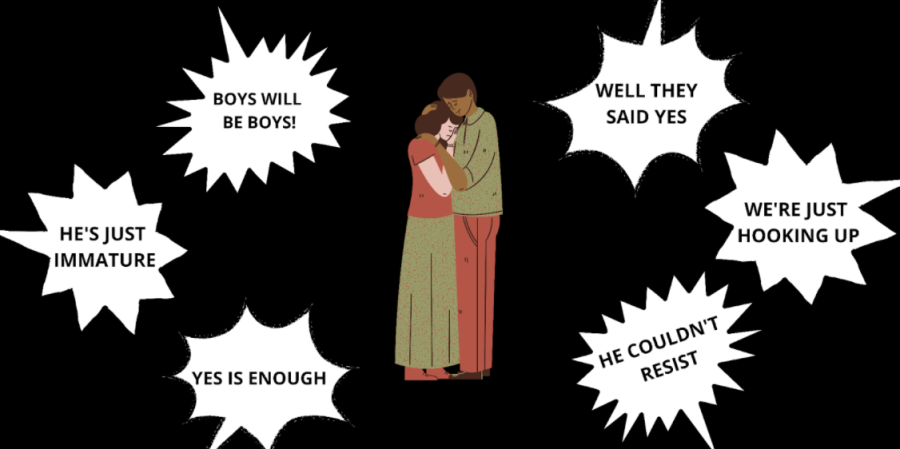In the Shadows: Popular phrases and concepts can have a deep impact on the reports of sexual crimes
January 21, 2022
Used in the English language since around 1589, the phrase “boys will be boys” can describe a boy’s tendency to be immature, and do childish things. Now, 433 years later, this phrase may continue with its original use, but following closely behind is a deeply dismissive connotation.
In the third installment of this series, I will look into what it is that makes this phrase so negative in the context of sexual assault, alongside another concept relating to hookup culture and proper consent. Finishing off the series next week, I will also dive into how relationships and friendships may contribute to apprehensiveness to report sexual crimes.
“Boys will be Boys”
While it may be used to describe innocent things such as boys not receiving consequences for grass stains on their pants and a broken toy or two, the phrase “boys will be boys” has developed into something much darker.
“This idea has emerged that boys, by their nature, are sexual,” LFHS social worker Dan Maigler said. “So, therefore, you just have to expect that when he’s near a girl, he’s going to have sex with her whether she wants to or not.”
At first thought, this may sound crazy, and something Maigler calls, “an insult to men everywhere.”
However, rather than pushing back against this claim, men are choosing to roll with it–why?
“It gives license to the idea that they can do whatever they want without consequences,” Maigler said.
In recent years, this phrase has become damaging to those speaking out against sexual assault. Those in defense of offenders have used “boys will be boys” to dismiss their transgressive and illegal actions.
Famously in 2018, professors all over the nation presented the phrase as justification for allegations brought against Supreme Court nominee–and now associate justice–Brett Kavanaugh. Rather than focusing on the issue at hand, they focused heavily on the workings of the adolescent brain and wrongfully argued that Kavanaugh had very little control over his teenage recklessness.
Events such as these have had a catastrophic impact on victims, as they decrease the feeling of validity when it comes to reporting. As if there was not enough pressure on victims in terms of believability, the idea of potential dismissal with an age-old, four-word phrase is terrifying.
Rather than excusing the behavior that inflicts trauma, men and women alike need to start doing their part in holding sex offenders accountable for their actions.
“Getting to yes”
In most situations, yes means yes. Example: “Hey, do you want to go to the basketball game Friday?” “Yes!” However, Maigler argues that in sexual situations, “yes” is not always enough to retain consent.
“The idea of getting to yes is what so many boys obsess over,” he said. “But a person can say yes and still feel assaulted.”
Maigler recalled the story of a girl he worked with who had snuck out of her house to hook up with an older boy. This is a relatively common occurrence, but the difference came when the “hooking up” began, and though the girl had given some sense of consent with a simple, “ok,” she found herself regretting her decision.
However, she was afraid to backtrack as not only had she gone to all this effort to meet the boy, but he was much more enthusiastic, and she feared his reaction when she withdrew. The point at which consent was nonverbally withdrawn was when this girl began to lack enthusiasm. Instead of stopping, and considering for a moment if she was really “ok,” the boy continued about his night.
Men and women alike must always keep the idea of enthusiasm in mind. Though it may seem like a “duh” kind of concept, in the heat of the moment, satisfaction could be blinding. A person’s actions and lack of focus on their partner may be the cause of what’s known as pressured consent.
This is different from forced consent in that a person may not be “forcing” their partner to participate, but they are making the person feel as though “no” is not an option, or they cannot withdraw consent. The issue with this is that sexual relations are not a one-man show. One partner must be just as comfortable and involved as the other in order for it to work.
The lack of this within our society can often be found in what Maigler calls a “toxic sexual culture.” Many people in their younger teens to early 20s will take relationships, primarily sexual ones, and refer to them as a “thing.”
While the definition may vary, “things” often refer to two people being “together” without putting a label on it as dating.
Maigler argues that these “things” really involve no emotional connection, and are usually to the benefit of men in the context of heterosexual relationships.
“What people don’t realize,” he said, “is sexual intimacy is much better with that emotional connection.”
This emotional connection could just be what would help prevent many people from feeling the violation and discomfort that too often stems from hookup culture and the idea of “getting to yes.”







